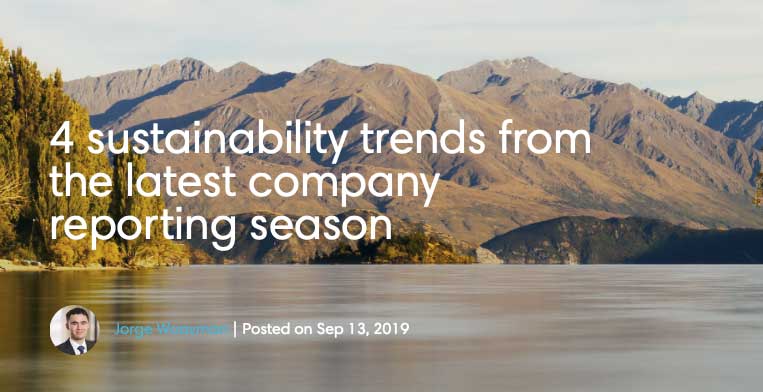
4 sustainability trends from the latest company reporting season
– Harbour Asset Management
Key points:
- Sustainability disclosure has improved
- Key focuses include climate change, diversity and waste
- Real world impact alignment on the rise
The August company reporting season featured many of New Zealand’s largest listed companies disclosing their sustainability initiatives over the year. We observed some of the key trends this season that corporates have been focusing on. These included climate change, gender diversity, waste and the UN’s Sustainable Development Goals (SDGs).
Climate change
Climate change has been at the forefront, with local policy reform and stakeholder pressure prompting corporates to start measuring their impact and introduce initiatives to reduce their emissions. We have seen an increased level of disclosure however the data quality leaves room for improvement given the estimated, unverified nature of most of the data. For example, we observed a2 Milk disclose greenhouse gas emissions data for the first time and some companies such as Contact Energy and Chorus have made progress towards reducing their emissions. However, some companies still lack disclosure in this area or have regressed in terms of their emissions. We will continue to monitor whether these companies can progress towards their long-term targets.
Gender diversity
Gender diversity has been a prominent theme, with companies such as Auckland International Airport and Meridian Energy increasing the proportion of women on the board and in senior leadership. Other aspects of diversity such as ethnicity and age have also been cited as focuses of companies such as the target of 20% Maori and Pasifika staff in Air New Zealand senior leadership.
Waste reduction
Another significant focus this year has been the reduction of waste. Many companies have reported initiatives and progress towards reducing the amount of waste (particularly plastic) in their operations. For example, Fletcher Building have reduced their waste to landfill by introducing recyclable material and increasing the use of biofuels and hybrid machinery across their business operations. This move to reduce waste aligns with action made by the NZ Government in the form of new regulations banning the distribution of single-use plastic bags from retailers that came into force in July this year.
UN Sustainable Development Goals
The UN’s SDGs have also featured in some annual reports as companies are identifying how their operations and sustainability initiatives are contributing to the 17 different SDGs. This represents a changing focus towards creating real world outcomes in the societies in which these companies operate, as opposed to making plans or policies without measurable external impact. However, a ‘greenwashing’ effect can still be evident within an SDG framework if companies have not provided evidence of how they have contributed to a particular SDG.
Jorge Waayman – Sep 13, 2019

